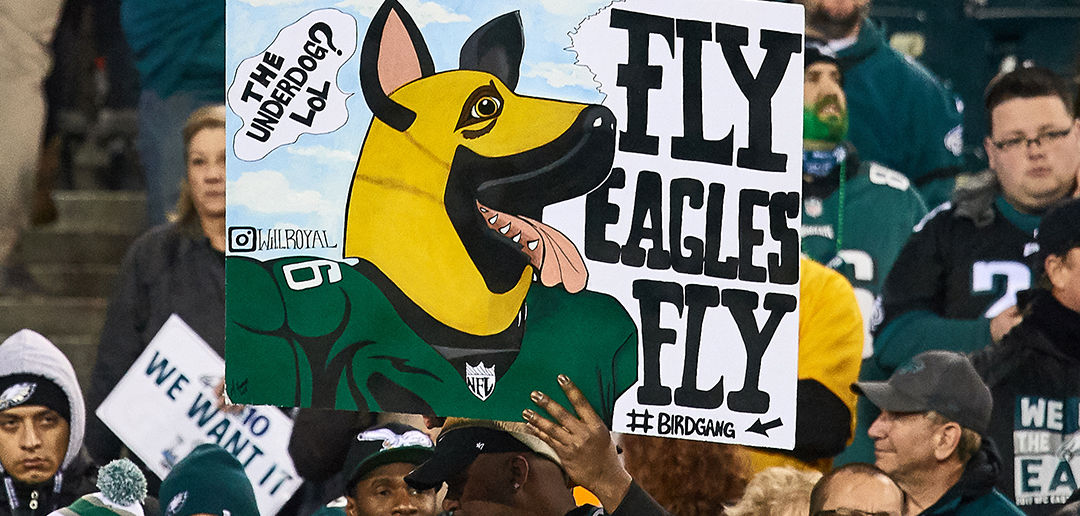Full disclosure: I am a total homer when it comes to all things sports related, so of course, being from Philly, I LOVE the way the Philadelphia Eagles have embraced the underdog status thrust upon them once their MVP candidate quarterback was lost for the season. They completely understand that on paper they shouldn’t be in a position to deny Tom and the Bradys their 2nd straight Super Bowl victory.
Never before in the history of the NFL has a No 1 seed, with home field advantage throughout the playoffs, been deemed an underdog by Las Vegas bookmakers. Despite those odds these birds...dogs...football players accomplished the unthinkable by not only winning their divisional round but also the conference championship earning them a spot in the Super Bowl.
There is no doubt that this football team gave a big bear hug to their underdog status as evidenced by the actual dog masks they donned at seemingly every opportunity. It’s obvious from listening to the players that they and the entire city of Philadelphia have completely and fully embraced the underdog mind set.
In an article for The Players’ Tribune, Eagles tight end Zach Ertz writes:
“Underdogs. No shot. Dead in the water. We heard it about 10,000 times over the course of that week: The first No. 1 seed since 1970 to be ’dogs in the divisional round. It wasn’t just us who embraced it. The whole city embraced it. If you’re an outsider, you probably don’t really get it. But if you’re from Philly, and if you’ve been following this team all year, then you know.”
This idea of taking on an underdog mentality goes beyond great strategy for pro ball players. It can provide a helpful framework for all of us as we walk through life’s many seemingly insurmountable obstacles. But more importantly, as followers of Jesus Christ we may benefit greatly from understanding our underdog nature, embracing our underdog savior, and living the underdog life.
Understand the Underdog Nature
If there is one theme in the Bible about the nature of humanity that is abundantly clear from Genesis to Revelation it is that we humans are really good at being really bad. Whether it is our tendency to worship physical idols instead of our Creator, or to treat our neighbors and fellow divine image bearers poorly, we human beings prove over and over again that we all have sinned and fallen short of the glory of God.
The Apostle Paul breaks it down nicely for us in his letter to the Ephesian Church when he says: “And you were dead in the trespasses and sins in which you once walked, following the course of this world, following the prince of the power of the air, the spirit that is now at work in the sons of disobedience—among whom we all once lived in the passions of our flesh, carrying out the desires of the body and the mind, and were by nature children of wrath, like the rest of mankind.” (Ephesians 2:1-3)
If I were a betting woman, I would place my money on the likelihood that we humans would be forever separated from God by our own doing and face just consequences for all the ways we have offended Him, each other, and the rest of His creation. In fact, given Paul's description, the odds of dead people doing anything, let alone cleaning up the mess we have made, is effectively zero. We are all underdogs to say the least.
Taking on this identity may seem like a prescription for lifelong depression. So what’s the point? It is essential for us to understand our underdog nature if we are going to embrace our underdog Savior because we cannot see our need for him unless we recognize our inability to fix the harm we have caused on our own.
Embrace the Underdog Savior
In his devotional entitled God’s Story Rasool Berry writes:
“Throughout the Scriptures, God chooses to identify with those who have little to no power and influence. We see this choice clearly in how God sends his son in the world, which Cleopas describes when he says, ‘About Jesus of Nazareth.’ God chose for his Son to be born a Jew, a small, conquered nation in a remote corner of the Roman world. Israel was nothing compared to the powerful and popular Rome. Even more surprising, Jesus was raised from a town with such a bad reputation that even Jesus’ disciples asked, “Can anything good come from Nazareth?” God consistently chooses the underdog.”
God chose an unlikely means to solidify an improbable relationship with an unworthy group of people. This Jesus of Nazareth, despite the conditions of his birth, lived a completely perfect life that reflected God the Father's definition of justice and goodness. Not only that, but he endured death, taking on the penalty we all deserve for the injustice we contribute to the world.
We must embrace this underdog Savior by faith so that when God looks at us he sees the goodness of Christ instead of the many ways we fall short of his glory. But this isn't a one time event. As believers we have to embrace him daily out of gratitude for His salvation and in order to live lives worthy of the Gospel of Christ (Phil 1:27). In his own words Jesus implores his followers:
“Abide in me, and I in you. As the branch cannot bear fruit by itself, unless it abides in the vine, neither can you, unless you abide in me. I am the vine; you are the branches. Whoever abides in me and I in him, he it is that bears much fruit, for apart from me you can do nothing.” (John 15:4-5)
Live the Underdog Life
Having embraced the underdog Savior we are empowered to live the underdog life He models for us. The Apostle Paul provides a helpful example of what that might look like when he writes “Do nothing from selfish ambition or conceit, but in humility count others more significant than yourselves. Let each of you look not only to his own interests, but also to the interests of others” (Phil 2:3-4). Underdogs are by nature humble. By understanding that we fall short of God’s just and good standards when left to our own devices, we are motivated to tap into the power Christ provides for us to live according to those standards.
In humility we can acknowledge that we don’t have all the information or wisdom needed to make the best decisions in life and we don’t have the willpower to even live up to the imperfect definitions of justice and goodness we create for ourselves.
Instead, with an underdog mentality, we can live by faith in God’s knowledge and wisdom, following his direction and obeying his call to put off selfishness and to look to the interests of others for his glory.














